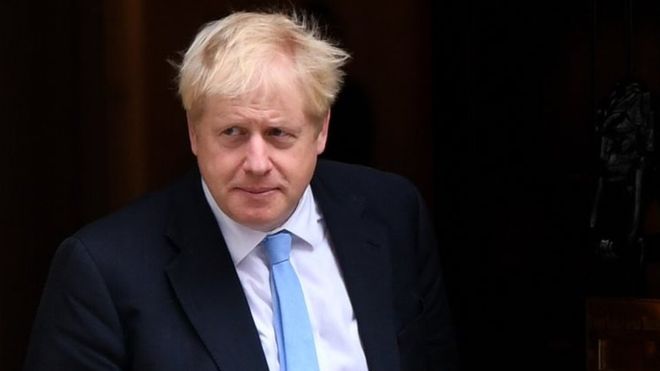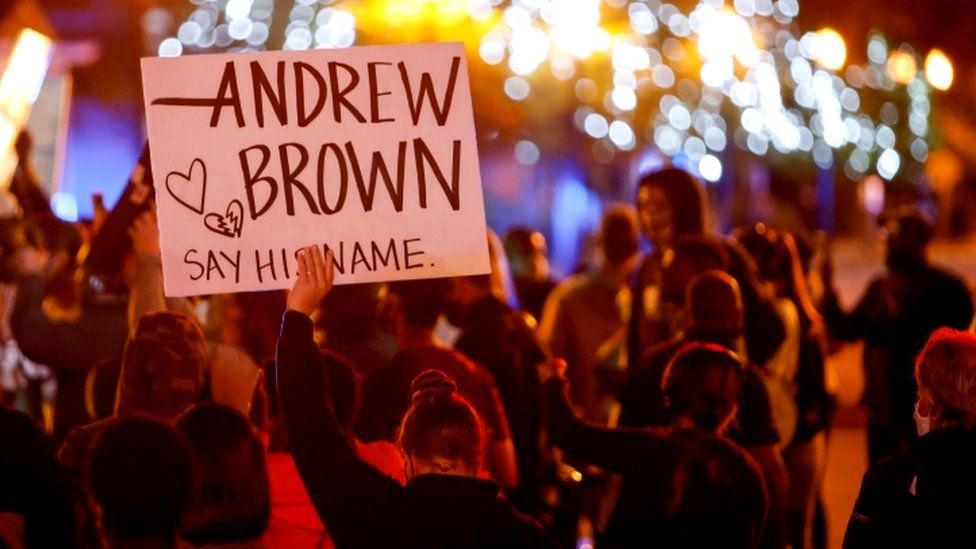Pope Francis on Iraq visit calls for end to violence and extremism
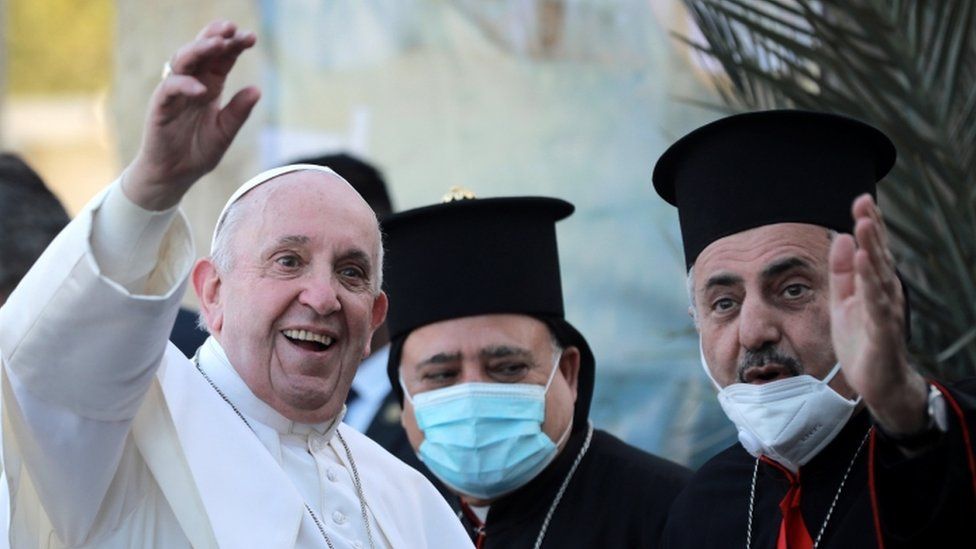
Pope Francis has called for an end to violence and extremism, on the first ever papal visit to Iraq.
The pontiff is making his first international trip since the start of the coronavirus pandemic.
Covid and security fears have made this his riskiest visit yet, but the 84-year-old insisted he was “duty bound”.
He also said Iraq’s dwindling Christian community should have a more prominent role as citizens with full rights, freedoms and responsibilities.
He is hoping to foster inter-religious dialogue – meeting Iraq’s most revered Shia Muslim cleric – and will celebrate Mass at a stadium in Irbil in the north.
About 10,000 Iraqi Security Forces personnel are being deployed to protect the Pope, while round-the-clock curfews are also being imposed to limit the spread of Covid.
Iraq’s PM Mustafa al-Kadhimi greeted him at the airport, with a red carpet, Iraqis in national dress and songs from a largely unmasked choir.
Hundreds of people lined the airport road as the Pope’s convoy, heavily chaperoned by police motorcycles, left for the city.
But the Pope was seen to have a pronounced limp, suggesting that his sciatica condition continues to bother him.
‘Rich Christian heritage’
In a speech after being welcomed by Iraqi President Barham Salih, Pope Francis said he was very pleased to come to Iraq, which he described as the “cradle of civilisation”.
“May the clash of arms be silenced… may there be an end to acts of violence and extremism, factions and intolerance!” he said.
“Iraq has suffered the disastrous effects of wars, the scourge of terrorism and sectarian conflicts often grounded in a fundamentalism incapable of accepting the peaceful coexistence of different ethnic and religious groups.”
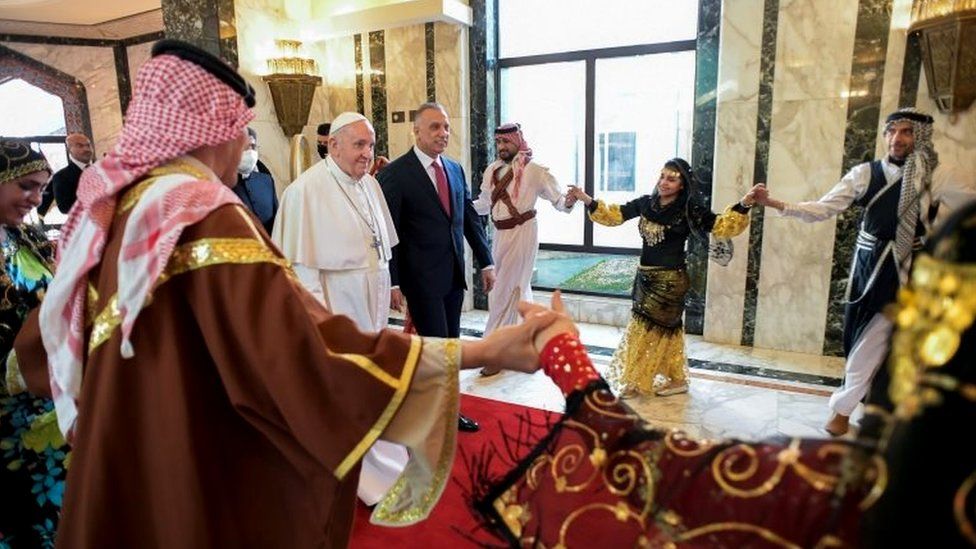 IMAGE COPYRIGHTREUTERS
IMAGE COPYRIGHTREUTERSHe turned to the country’s Christians, who he said should have a greater role in public life.
“The age-old presence of Christians in this land, and their contributions to the life of the nation, constitute a rich heritage that they wish to continue to place at the service of all,” he said.
He said Iraq’s diversity was a “precious resource on which to draw, not an obstacle to eliminate”.
Pope Francis later went to hold Mass in Baghdad’s Syriac Catholic church of Our Lady of Salvation, targeted in an attack in 2010 by jihadists which left 52 Christians and police dead.
Christians ‘need to feel emboldened’
This is a pilgrimage by a Pope who has made reaching out to the persecuted and to other faiths a cornerstone of his papacy.
Pope Francis’s trip is rich in symbolism but fraught with danger – not just the security concerns of a country torn by inter-religious and sectarian conflict but also in the midst of its highest infection levels since the start of the pandemic.
There is the risk that the importance of this trip is overshadowed by Covid – particularly that a mass in Erbil on Sunday, at which up to 10,000 people are expected, could become a super-spreader.
But Pope Francis is defiant, telling me on the plane from Rome that he is “very happy” to be on a “special trip”. He clearly feels that this land, so central to Christianity, has waited too long for a papal visit, that its dwindling and long-terrorised Christian community needs to feel emboldened so as to remain here – and that there is no time to lose to bring a message of peace and hope to Iraq.
One of the world’s oldest Christian communities has seen its numbers plummet over the last two decades from 1.4 million to about 250,000, less than 1% of the population.
Many have fled abroad to escape the violence that has plagued the country since the US-led invasion in 2003 that ousted Saddam.
Tens of thousands were also displaced when Islamic State (IS) militants overran northern Iraq in 2014, destroying their historic churches, seizing their property, and giving them the choice to pay a tax, convert, leave or face death.
How is the Pope being received?
Security arrangements are massive, with the Pope mostly flying to make his visits, and possibly using an armoured car for shorter trips. In central Baghdad, billboards welcome the Pope, and Iraqi and Vatican flags fly together.
The Christians of Iraq are hoping the Pope will help them overcome discrimination.
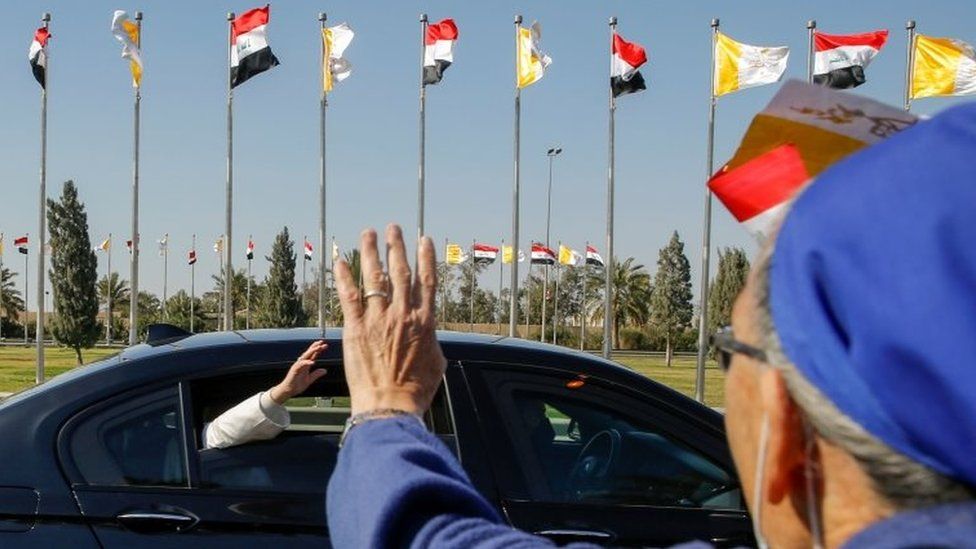 IMAGE COPYRIGHTREUTERS
IMAGE COPYRIGHTREUTERSIn Baghdad, there was joy that he was visiting.
“I feel an indescribable happiness. We’re all brothers and sisters, we’re all one hand. We’re all going to greet someone great, the greatest figure, the Pope,” Naem Faouzi told Reuters news agency.
Father Martin Ra’ad, a Christian priest said: “Today, Pope Francis is realising the dream that Iraqis have had for the past 20 years, waiting for him to arrive on Iraqi soil.”
Christians in the north were also looking forward to his visit. Alla Hana Shaba, who fled to Irbil in Iraq’s Kurdistan region after the IS invaded in 2014, told Iraqi TV: “We want the Pope to help the displaced find a place to settle. We have lost our houses and money.”
Who are Iraq’s Christians?
- People in what is now Iraq embraced Christianity in the 1st Century AD
- According to the US state department, Christian leaders estimate there are fewer than 250,000 Christians remaining in Iraq, with the largest population – at least 200,000 – living in the Nineveh Plain and Kurdistan Region in the north of the country
- Approximately 67% of those are Chaldean Catholics, whose Eastern-rite Church retains its own liturgy and traditions but recognises the authority of the pope in Rome. Another 20% are members of the Assyrian Church of the East, believed to be the oldest in Iraq
- The rest are Syriac Orthodox, Syriac Catholic, Armenian Catholic, Armenian Apostolic, as well as Anglican, Evangelical and other Protestants

What is the Pope’s schedule?
Due to security concerns and a sharp rise in Covid-19 infections, the Pope will have limited exposure to the public, our correspondent says.
The Pope himself has had two shots of the BioNTech/Pfizer vaccine, and his entourage will have been inoculated, but there are fears the trip could become a super-spreader event given the large crowds expected.
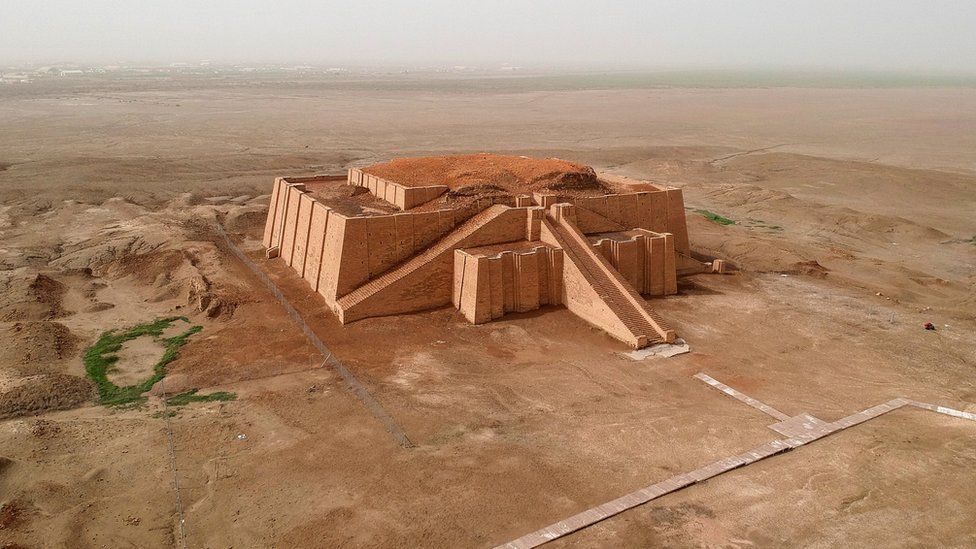 IMAGE COPYRIGHTREUTERS
IMAGE COPYRIGHTREUTERSOn Saturday, the Pope will fly south to the Shia holy city of Najaf, where he will visit 90-year-old Grand Ayatollah Ali al-Sistani, the spiritual reference for millions of Shia in Iraq and elsewhere.
The following day in Mosul he will say a prayer of suffrage in Church Square for the victims of the war with IS, which left tens of thousands of civilians dead.
The Pope will also visit nearby Qaraqosh, where Christians have returned since the defeat of IS in 2017.
BBC.COM


